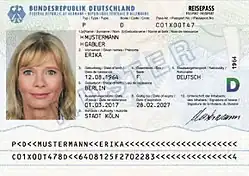Polycarbonate e-passport
A polycarbonate e-passport is a type of travel document that features a biometric data page made from polycarbonate, a durable plastic material, rather than a laminated paper sheet. This construction offers enhanced protection for the passport’s electronic components and personal data. By laser-engraving information into the inner layers of the plastic, polycarbonate e-passports significantly improve resistance to counterfeiting and offer greater durability and reliability compared to traditional laminated pages.[1][2][3]
Finland was the first country to introduce a passport with a polycarbonate data page in 1997.[4] Sweden followed shortly after, becoming the first to implement a biometric polycarbonate data page during the early adoption of e-passports. Since then, the design has gradually been adopted around the world.[5]
As of 2019, over 40 countries have transitioned from laminated paper biometric data pages to polycarbonate alternatives in their passports.[6]
List of polycarbonate passports
.svg.png) Australia: Issued since September 2022.[7]
Australia: Issued since September 2022.[7] Cambodia: Issued since 2014.[8]
Cambodia: Issued since 2014.[8].svg.png) Canada: Introduced in May 2023.[9]
Canada: Introduced in May 2023.[9] East Timor: Issued since 2017.[10]
East Timor: Issued since 2017.[10] Hong Kong: Issued since 2007.[11][12]
Hong Kong: Issued since 2007.[11][12] Indonesia: Issued since 2023.[13]
Indonesia: Issued since 2023.[13] Japan: Issued since March 2025.[14]
Japan: Issued since March 2025.[14] Macau: Issued since 2009.[15]
Macau: Issued since 2009.[15] Malaysia: Issued since 2013.[16]
Malaysia: Issued since 2013.[16] New Zealand[17]
New Zealand[17] Singapore: Issued since 2006.[18]
Singapore: Issued since 2006.[18] South Korea: Issued since 2021.[19]
South Korea: Issued since 2021.[19] Thailand: Issued since 2020.[20]
Thailand: Issued since 2020.[20] United States: Issued since 2021.[21]
United States: Issued since 2021.[21]
See also
References
- ^ "Understanding the Key Differences Between Polycarbonate E-Passports and Regular E-Passports". Indonesia Consultant Agency. 2024-08-23. Retrieved 2024-11-24.
- ^ "Information about the Next Generation U.S. Passport". travel.state.gov. Retrieved 2024-11-24.
- ^ "KINEGRAM for passport protection and passport authentication". www.kinegram.com. Retrieved 2024-11-24.
- ^ "Finland Selects Gemalto for Its New Secure Electronic Passport and eID". printed electronics now. Jan 22, 2016.
- ^ "The Paper vs Polycarbonate Passport Debate An ITW Security Division White Paper – March 2017" (PDF). www.itwsf.com.
- ^ Jacquot, Frederic (October 3, 2019). "How Polycarbonate is Creating More Secure Passport Datapages". HID. Archived from the original on 8 December 2024.
- ^ "Australia has a new passport". Australian Passport Office. 14 September 2022. Archived from the original on 8 June 2023.
- ^ Everyday (2014-07-16). "Cambodia introduces new passport with ten-year validity". Everyday.com.kh. Archived from the original on 2019-12-21. Retrieved 2025-08-07.
- ^ "Canada unveils new passport design with state-of-the-art security features". www.canada.ca. Immigration, Refugees and Citizenship Canada. 10 May 2023. Retrieved 14 July 2025.
- ^ Thales Group (2017-06-06). "East Timor government goes live with Gemalto's electronic passport solution". Thales Group. Retrieved 2025-08-07.
- ^ "New passports to come with security upgrades, creative UV prints". South China Morning Post. 1 February 2019.
- ^ "Physical Features and Design of Electronic Passport". Hong Kong Immigration Department. 1 February 2019.
- ^ Directorate General of Immigration (2023-05-04). "Apa Itu Paspor Elektronik Lembar Polikarbonat dan Di Mana Bisa Mengajukannya? Simak Penjelasan Berikut Ini!". Directorate General of Immigration (in Indonesian). Retrieved 2025-08-07.
- ^ "Passport Design To Be Changed To Combat Forgery ; New Passport Applications Will Be Available Online From March 24". japannews.yomiuri.co.jp. The Yomiuri Shimbun. 4 January 2025.
- ^ NEWS GOV-MO: 第三代澳門特區旅行證件 智•慧齊升 [The Third Generation of Macao SAR Travel Documents: Smarter and More Intelligent]. NEWS GOV-MO (in Chinese (Macau)). Gabinete de Comunicação Social do Governo da RAEM. Retrieved 19 July 2025.
- ^ Thales Group. "The Malaysian electronic passport is a piece of art". Thales Group. Retrieved 2025-08-07.
- ^ "New style ePassport released today". Beehive.govt.nz. Government of New Zealand. 24 November 2009. Retrieved 14 July 2025.
- ^ "Evolution of Passports". ICA. Immigration & Checkpoints Authority (ICA).
2006: Singapore's biometric passport (BioPass) was officially launched. The BioPass contained the holder's unique biometric identities such as fingerprint data, facial image and passport details on a contactless chip. With the personal particulars digitally stored in the chip embedded in a polycarbonate data-page, the BioPass complied with standards set by the International Civil Aviation Organisation for electronic machine-readable travel documents.
- ^ "외교부 여권안내 홈페이지".
- ^ Perala, Alex (2020-08-11). "Thales Formally Delivers Thailand's New Biometric Passport". ID Tech. Retrieved 2025-08-07.
- ^ "Information about the Next Generation U.S. Passport". United States Department of State. Retrieved 14 July 2025.


_data_page.jpg)
